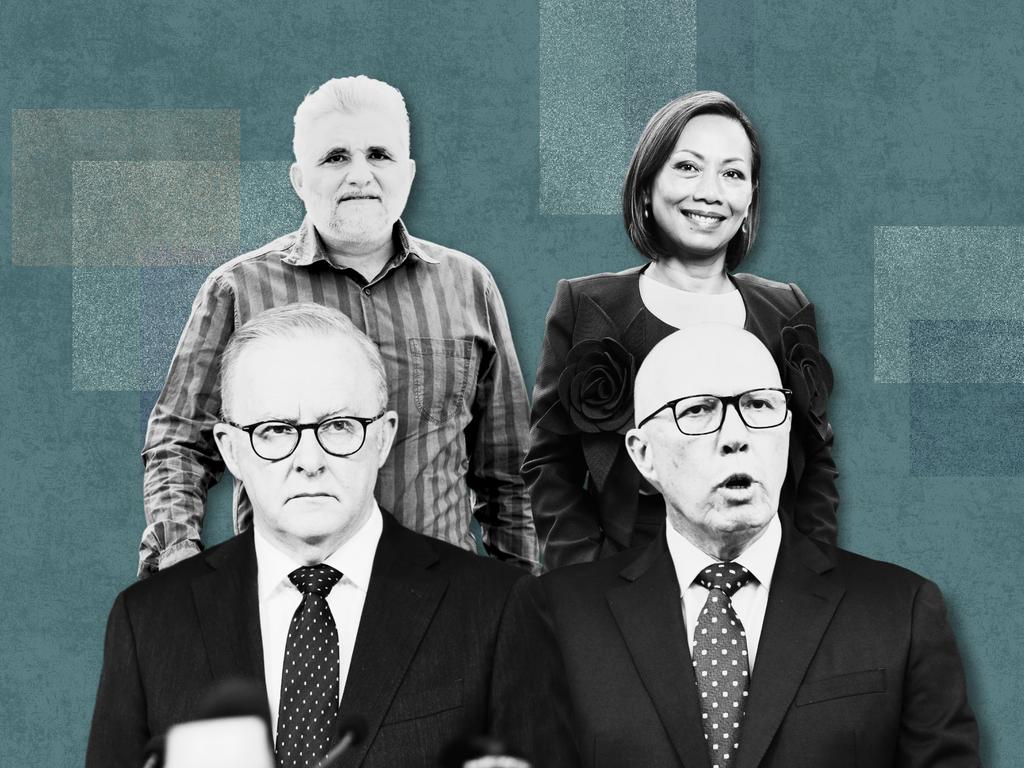Hard-left teals mask true position as the Claytons of political parties
Aside from deciding whether Labor can remain in government, this election probably matters most for whether it confirms an ongoing place in our body politic for the teals.

The teals are having fun, that much we know. They are loving themselves sick on social media, getting plenty of love from influencers (even if they need to pay for it), popping up on the ABC and rolling in huge amounts of campaign cash as they turn marginal seat campaigning into multimillion-dollar operations.
Unaccountable as they preach accountability, opaque as they promote transparency, big spending as they oppose money in politics, alarmist as they advocate science, organised and funded by a man as they claim to advance women, and claiming independence as they behave like a party, the teals are nothing if not contradictory. And they have had an entertaining year.
Monique Ryan’s husband stole her opponent’s campaign poster, Allegra Spender failed to declare seven of her corporate entities until media revealed her oversight, and Zoe Daniel and other teals have tried to distance themselves from push-polling on the basis it was commissioned not by them but their funding and strategic partner, Climate 200.
The teals’ slogan should be “do as I say, not as I do”.

With the major parties remaining on the nose and failing to inspire or polarise the voting choice, the plethora of minor parties and independents stands to benefit again at this election. Aside from deciding whether Labor can remain in government, this election probably matters most for whether it confirms an ongoing place in our body politic for the teals.
Are they a flash in the pan? Or are they the new third force in the lower house?
The teals are, as I said during the 2022 campaign, the “most fraudulent political movement” in living memory. This is because they are the green left that dares not speak its name – everything about their positioning betrays a highly co-ordinated, anti-Coalition, green-left operation but they claim to be both centrist and independent.
Realistically, to win government, the Coalition must not only win more than a dozen seats from Labor but also up to a half-dozen from the teals. The teals have taken seats only from the Coalition and any public admission of a green-left bent or a predilection to support a Labor-Greens minority government might count against them at the ballot box; perish the thought that voters are trusted with such transparency.
Instead, when asked about their likely actions in the event of a hung parliament, we get a range of answers about being guided by the views of their electorates. This did not work out particularly well for Tony Windsor and Rob Oakeshott, or the country, back in the day.

Perhaps if there were strong product differentiation between the major parties and a significant debate over policy differences at this election, the teals would have been sidelined. But with the main contest less than compelling so far, it is likely the teals movement will survive, perhaps thrive, and go on to be a significant player for at least another term. More is the pity.
The teals claim to share three guiding principles, as outlined by the Climate 200 outfit that co-ordinates and funds them. The first goal is a “science-based response to the climate crisis” – something of an oxymoron given the term crisis instantly shifts their position from science to emotion.
They also claim to be focused on women’s rights. This too falls at the first hurdle given the teal MPs, all women, are endorsed, funded and organised by a man – Simon Holmes a Court, the millionaire son and heir of billionaire Robert Holmes a Court. (Climate 200 also has supported ACT senator David Pocock but he has stepped away from it now.)

The teals and Holmes a Court are so sensitive about these arrangements that when The Australian Financial Review decided to include Holmes a Court on its annual Power List, the paper was lobbied by Daniel’s office to drop him.
It seems Holmes a Court exercises so much influence through the teals that it embarrasses them, yet he cannot resist occasionally addressing the National Press Club or other gatherings, essentially on their behalf.
Perhaps the most interesting and contradictory principle espoused by the teals, and outlined by Climate 200, is their commitment to “restoring integrity” in politics.
This undertaking looks a little shopsoiled, what with the push-polling revelations, Spender’s declaration failures, her paid social media promotions and Ryan’s failure to insist instantly that paid influencing should be disclosed. Imagine the green-left outrage if a conservative politician were paying influencers to promote their agenda without that funding being declared in the content.
Yet when it was revealed that Spender was secretly buying social media influence, Ryan was dumbstruck when asked about the issue on the ABC. The member for Kooyong said she needed time to think about it before pausing for long periods, live to air, without think music, and declaring again that she needed to consider the matter further.

For anyone even vaguely interested in political integrity this was a no-brainer. Paid spruiking for politicians must be declared. (Ryan later agreed such sponsorships should be declared and an AEC ruling demanded it.)
Living in the heart of teal country, where posters of a smiling Spender look down from every light pole, I often try to place myself inside the mind of a teal voter. “She seems nice,” is the way some Spender voters have explained their support to me.
Given I admired Paul Keating and Peter Garrett in my late teens and 20s, I have never had a problem understanding the thought processes and instincts of the traditional left. But why would anyone vote teal? They cannot achieve anything except keeping the Coalition out of power; they are bit players and commentators rather than doers. Surely voters would want a representative who might be involved in government, help run the country?
Every now and then they let their guard down and show hard-left tendencies. The teals, including Spender, Ryan and Daniel, whose seats have large Jewish communities, signed a letter demanding the federal government restore funding to UNRWA even after it was confirmed some of its staff had joined with Hamas in conducting the October 7 atrocities.
The teals get involved in local issues and style themselves as community voices in much the same way as mayors.
In this way they almost replicate local council politics, campaigning on local park redevelopments and promising a “kinder” community. “Your values. Your voice,” is the slogan that accompanies Spender’s smiling visage. It goes to the core of the teal strategy and ultimately to the dumbing down of our democratic processes.
It seems some voters are looking for a mirror, not a politician to deliver outcomes but one to identify with. This is a reflection of social media in real life.

On Instagram and Facebook people parade their views with symbols, emojis and shared posts – it is the very definition of virtue signalling.
The causes and people they identify with on social media are organised to promote their preferred version of themselves, their social brand if you like.
This is all pervasive in society, and the younger you are the more prevalent it is. So it was probably inevitable that this would be reflected in politics.
In a world where the sacred protection for democracy is the secret ballot, teal T-shirts display political preferences like a fashion statement.
You do not have to ask who votes for the teals, they cannot wait to tell you.
Identifying with the teals is a way of disassociating yourself from the hard choices of major parties and effective governance.
Confronted with compulsory voting, it is way to pretend you are not voting for a politician.
The paradox is that the teals are as organised and political as any players in the game. Like uber-successful South Australian political phenomenon Nick Xenophon, the teals fashion cynical, populist political careers out of pretending to be anti-politicians.






